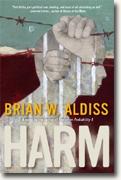Harm
Brian Aldiss
book reviews:
· general fiction
· chick lit/romance
· sci-fi/fantasy
· graphic novels
· nonfiction
· audio books
· author interviews
· children's books @
curledupkids.com
· DVD reviews @
curledupdvd.com
newsletter
win books
buy online
links
home
for authors
& publishers
for reviewers

 |
Harm Brian Aldiss Del Rey Hardcover 240 pages May 2007 |
|
Brian W. Aldiss is a prolific author most often working in science fiction. His newest novel, entitled Harm
The author has written part of a story which should be taken as a wake-up call. People must know the reality we now face, one which may only get worse. The conditions that Paul faces in prison in no way follow the Geneva Convention. He is tortured both mentally and physically in a way that cannot be justified. If the West has not yet practiced these methods of interrogation, they are not far off. This reality-based half of the novel is certainly a stunning indictment of the techniques now being used in the war on terror. Governments must be careful of how they treat basic human rights. In many cases they are already being curtailed, and it is not too difficult to picture a near-future time, if it is not already here, when people are arrested merely for being Muslim. This is a most dangerous type of profiling. In this part of the book, Aldiss tells a powerful story. However, the story of the imaginary world Stygia is not told nearly as effectively. One gets the sense from the beginning that this future world, Stygia, and the events that take place upon it, are part of the authorís response to the war on terror. Each page pushes the reader farther along this line of thought; unfortunately, it is never clear exactly where the author is heading. On this new world, the settlers have eliminated an entire race of sentient beings which are considered, without much evidence, a dire threat. There is also terrible violence committed upon every other Stygian creature. The humans are unable, or unwilling, to understand these foreign life forms - and in their lack of understanding, they strike out in incomprehensible violence. Creatures are murdered simply because they may be dangerous, or because they look so incredibly strange. Most life on Stygia has taken on a insect-like form. This likely creates more tension among the colonists, as insects on their home planet are often things to be exterminated. Again, there is much here to think about and compare with conditions in Paul Fadhilís London. Although it is almost certain that this represents the conflict between the West (or Christianity) and the Muslim world, it remains difficult to completely grasp the underlying analogy. Another weakness in the novel is Brian W. Aldissí prose, which is often awkward. Dialogue between characters feels unnatural, breaking the spell he is trying to cast on the reader. It is difficult to become immersed in a novel in which characters speak abnormally. It is also at times difficult to follow the action. Most often these problems appear in the sections of the book taking place on Stygia. Some of this is due to the method in which the colonists travel to the new world; they are reconstituted from a biological soup, and some problems occur during the reconstruction. But the dialogue issues are not entirely addressed by this. It feels sometimes as though some of the problems occurred through a translation of the novel to English - but the novel was originally written in English. While there is much to think about in Harm Originally published on Curled Up With A Good Book at www.curledup.com. © Matt Eskesen, 2007 |
|
|
|
 Click here to learn more about this month's sponsor! |
|
| fiction · sf/f · comic books · nonfiction · audio newsletter · free book contest · buy books online review index · links · · authors & publishers reviewers |
|
| site by ELBO Computing Resources, Inc. | |
 Unfortunately, the government does not take kindly to his comedic reference to blowing up the prime minister. In this near-future Britain, where Muslim terrorists strike hard and often, freedom of speech has been curtailed along with many other freedoms. Paul is taken into custody and kept captive in a large house converted to a prison. He is kept completely in the dark about where this prison is located and constantly tortured. In order to escape from this terrible existence, Paul imagines a far-future alien world where he is called Fremant. The world is called Stygia, a reference to Miltonís Paradise Lost. Stygia has been colonized by people fleeing Earth.
Unfortunately, the government does not take kindly to his comedic reference to blowing up the prime minister. In this near-future Britain, where Muslim terrorists strike hard and often, freedom of speech has been curtailed along with many other freedoms. Paul is taken into custody and kept captive in a large house converted to a prison. He is kept completely in the dark about where this prison is located and constantly tortured. In order to escape from this terrible existence, Paul imagines a far-future alien world where he is called Fremant. The world is called Stygia, a reference to Miltonís Paradise Lost. Stygia has been colonized by people fleeing Earth.